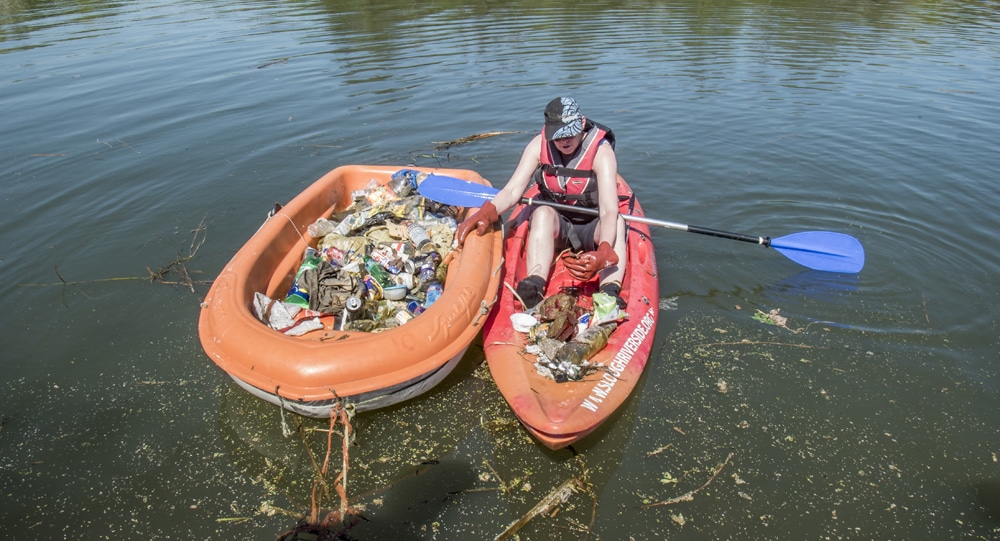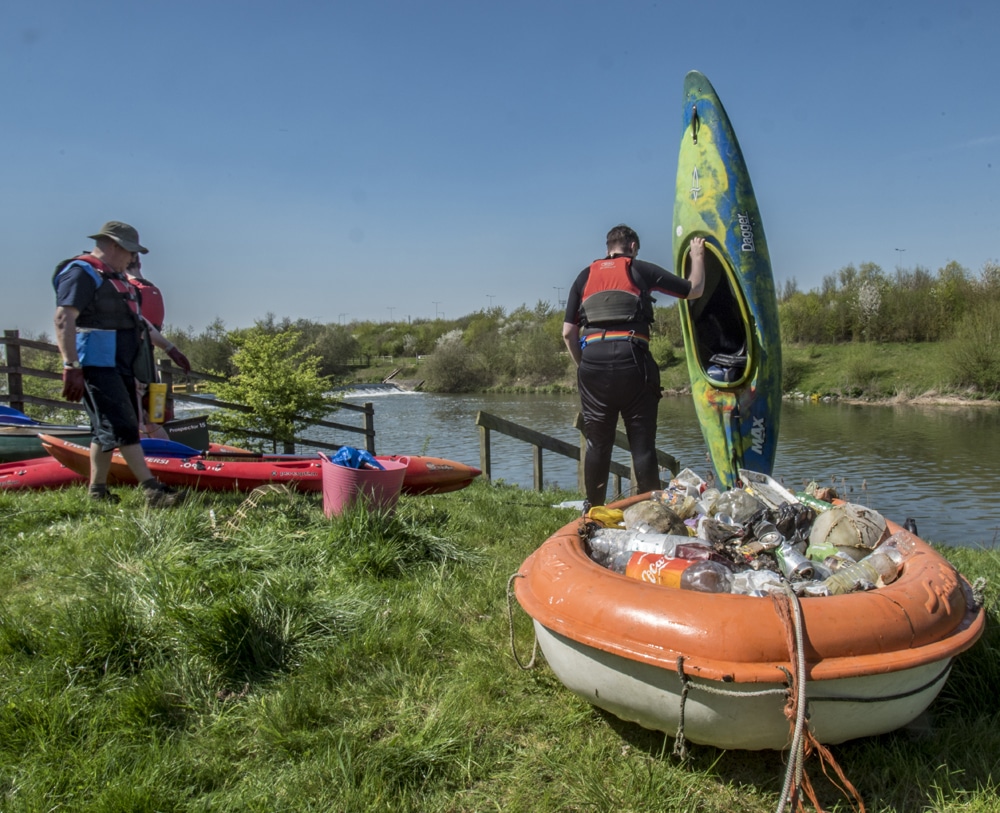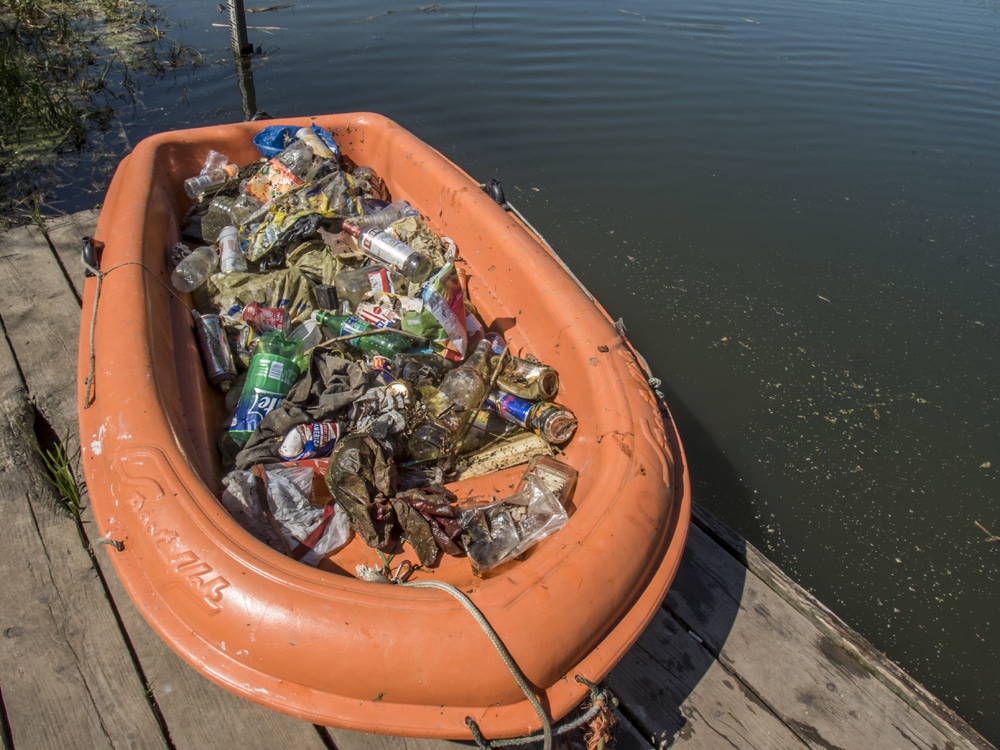Marine Life & Conservation
New River Thames ‘source to sea’ pollution data finds majority of litter found is single-use

 Over 60% of litter would disappear from Thames basin if we moved away from single-use items say the Marine Conservation Society and Thames21
Over 60% of litter would disappear from Thames basin if we moved away from single-use items say the Marine Conservation Society and Thames21
A series of river cleans along the Thames and its tributaries has revealed that more than 80% of litter found in the Thames, and 78% on its tributaries, was made up of single-use items such as metal drink cans, food packaging and plastic drinks bottles.
The events were run by the Marine Conservation Society (MCS) and waterways charity Thames21 as part of the Waitrose & Partners/MCS beach and river clean programme. The analysis also gives a snapshot of the source to sea pathway for litter and the way it breaks down over time.

Thames21 ran 20 river clean events towards the end of 2017 and into 2018 at Thames tributaries and tidal Thames sites. The evidence was compared to MCS beach litter data from four beach cleans at Southend-on-Sea.Depending on which part of the Thames the cleans-up took place, different items predominated. Metal drinks bottles were commonly found on the tributaries, but fewer were found on the Thames foreshore. Wet wipes were found in huge numbers during the clean-ups on the Thames foreshore, whilst glass and unrecognisable plastic litter dominated at the estuary cleans.The concentration of litter items found per 100m rose as the Thames made its way towards the sea, due to the increased opportunity for humans to influence the ecosystem.
16 events took place at Thames tributaries including the river Lea in Hackney, the Bear Brook in Aylesbury, and the river Brent in Neasden. On the tributaries, volunteers found that 78% of the items they picked up were single-use with an average of 219 pieces of rubbish collected for every 100m surveyed. The four events on the Thames Foreshore found that 86% of the litter items recorded were single-use with a higher concentration of items found – an average of 1,402 per every 100m surveyed.
At Southend-on-Sea, where the Thames meets the sea, just under half of all items found (48%) were recognisably single use, but the concentration of small pieces of litter increased further, with a huge 2,520 items per every 100m surveyed.
Of those 2,520 items, 560 (28%) were unrecognisable, small plastic items. Lauren Eyles, MCS Beachwatch Manager, says that the proportion of single use plastic was harder to measure at estuary and coastal sites as the plastic has already broken down: “We find much more unidentified, tiny plastic at these sites because the plastic has been floating around for some time. However, they may well have once been single-use. Beach cleaners are far more likely to find microplastics these days than larger identifiable items.”
Both MCS and Thames21 are calling for a Deposit Return Scheme which has been shown to cut not just plastic pollution but from other materials too such as metal and glass.
‘These findings clearly show that we urgently need a Deposit Return Scheme, as well as alternatives to single-use,’ said Debbie Leach, CEO of Thames21. ‘Eighty per cent of the waste we found on the Thames foreshore, and nearly the same amount on the tributaries would disappear if we moved away from single-use items; and one way to do this is through a DRS.’
The urgent problem of wet wipes, which often contain plastic, was also revealed in the report – making up 77 per cent of all items removed on the tidal Thames foreshore, and an average of 1,000 at the 4 cleans that took place.
Lauren Eyles says the data from these cleans will give the charity a more complete picture of the source to sea journey of litter: “Rivers are being harmed by a variety of different pollutants, including large amounts of plastic. Eighty per cent of ocean litter comes from land, channelled there by our rivers.”
Tor Harris, Head of CSR, Health & Agriculture for Waitrose & Partners, said: “The marine and river environment is important to all of us which is why we we’re delighted to have partnered with MCS for their ‘Source to Sea’ programme. The evidence will help us, and others, focus on reducing pollution from materials such as plastics. Our customers are very engaged in the issue of plastic pollution, so initiatives like this help both customers and Partners get actively involved in addressing the problem and finding alternatives to single-use plastic.”
Visit www.mcsuk.org to find out more.
Blogs
The Ocean Cleanup Breaks 10,000,000 KG Barrier

The Ocean Cleanup, the global non-profit project, has removed a verified all-time total of ten million kilograms (22 million lbs.) of trash from oceans and rivers around the world – approximately the same weight as the Eiffel Tower.
To complete its mission of ridding the oceans of plastic, The Ocean Cleanup uses a dual strategy: cleaning up the Great Pacific Garbage Patch (GPGP) to remove the plastic already afloat in the oceans, while stopping the flow of plastic from the world’s most polluting rivers.
Through cleaning operations in the GPGP and in rivers in eight countries, the cumulative total of trash removed has now surpassed ten million kilograms. This milestone demonstrates the acceleration of The Ocean Cleanup’s impact, while underlining the astonishing scale of the plastic pollution problem and the need for continued support and action.
While encouraging for the mission, this milestone is only a staging point: millions more tons of plastic still pollute our oceans and The Ocean Cleanup intends to continue learning, improving and innovating to solve this global catastrophe.
This announcement comes as governments from around the world meet to continue negotiations to develop a new legally binding instrument to end plastic pollution at INC4 in Ottawa, Canada. Representatives of The Ocean Cleanup will be in attendance and the organization will be urging decision-makers to collaborate towards a comprehensive and ambitious global treaty which addresses plastic at all stages of its life cycle and in all marine environments worldwide, including in areas beyond national jurisdiction.
It is encouraging to see that the need for remediation is reflected in the various options for potential treaty provisions. It is essential that the final treaty contains clear targets for the remediation of legacy plastic pollution, and reduction of riverine plastic emissions.
Tackling plastic pollution requires innovative and impactful solutions. The treaty should therefore incentivize the innovation ecosystem by fostering innovations that make maximal use of data, technology and scientific knowledge – such as those designed and deployed by The Ocean Cleanup.
‘After many tough years of trial and error, it’s amazing to see our work is starting to pay off – and I am proud of the team who has brought us to this point.’ said Boyan Slat, Founder and CEO of The Ocean Cleanup. ‘While we still have a long way to go, our recent successes fill us with renewed confidence that the oceans can be cleaned.’
The Ocean Cleanup was founded in 2013 and captured its first plastic in 2019, with the first confirmed catch in the GPGP coming soon after the deployment of Interceptor 001 in Jakarta, Indonesia. After surpassing one million kilograms of trash removed in early 2022, the non-profit project has since progressed to the third iteration of its GPGP cleaning solution, known as System 03, and a network of Interceptors currently covering rivers in eight countries, with more deployments set for 2024.
About The Ocean Cleanup
The Ocean Cleanup is an international non-profit organization that develops and scales technologies to rid the world’s oceans of plastic. They aim to achieve this goal through a dual strategy: stemming the inflow via rivers and cleaning up the legacy plastic that has already accumulated in the ocean. For the latter, The Ocean Cleanup develops large-scale systems to efficiently concentrate the plastic for periodic removal. This plastic is tracked and traced through DNV’s chain of custody model to certify claims of origin when recycling it into new products. To curb the tide via rivers, The Ocean Cleanup has developed Interceptor™ solutions to halt and extract riverine plastic before it reaches the ocean. Founded in 2013 by Boyan Slat, The Ocean Cleanup now employs a broadly multi-disciplined team of approximately 140. The foundation is headquartered in Rotterdam, the Netherlands.
For more information, visit: theoceancleanup.com and follow @theoceancleanup on social media.
Marine Life & Conservation
Steve Backshall to headline Shark Trust’s flagship event: For the Love of Sharks

Join a host of amazing, shark loving, speakers including Steve Backshall and the Shark Trust team for an evening celebrating shark conservation at the Royal Geographical Society in London this November.
Date: 29th November 2024
Time: 6-10pm
Location: Royal Geographical Society, London
Tickets: https://www.sharktrust.org/Event/flos24
The event will be a celebration of all things shark. Those lucky enough to get hold of tickets will hear from engaging guest speakers with a passion for sharks.
The line-up includes (*subject to change if unforeseen circumstances arise)
Steve Backshall: One of television’s busiest presenters, BAFTA award-winning wildlife expert Steve has been passionate about the wild world ever since he was young.
Steve’s impressive TV career has taken him all around the world, investigating a wide array of species and environments. Steve has filmed over 100 hours of children’s wildlife programmes with the BAFTA award winning Deadly 60 franchise and recently, with Sky Nature, for his new series ‘Whale with Steve Backshall’. He has been a patron for the Shark Trust for 10 years.
Simon Rogerson: is a photojournalist specialising in natural history, diving and the sea.
He is editor of SCUBA magazine, the official journal of the British Sub-Aqua Club. Simon started his career as a crime reporter but gravitated towards his ‘less depressing’ interest in underwater exploration, joining the staff of DIVE magazine in 1999. In 2005 he was named ‘Editor of the Year’ in the PPA’s Independent Publishing Awards. Simon also works as a freelance writer, contributing frequently to the Sunday Times and Telegraph, in addition to BBC Wildlife, Esquire, and a host of international diving magazines. He is the author of a book, Dive Red Sea, published by Ultimate Sports. Now based in Berkshire, Simon has been a Patron of the Shark Trust for 20 years.
More speakers to be announced soon. Head to the Shark Trust website to learn more.
The evening will also allow guests the final chance to see the Oceanic 31, shark art exhibition. Some of the artwork will be auctioned/raffled at the event, while the rest will be auctioned online to raise money for the Shark Trust Oceanic Programme.
For the Love of Sharks is an evening with something for everyone who is interested and fascinated by sharks. Join the Shark Trust, their Patrons, Trustees and Staff, along with a host of supporters for this celebration of shark conservation.
For more information or to buy a ticket: https://www.sharktrust.org/Event/flos24
-

 News3 months ago
News3 months agoCapturing Critters in Lembeh Underwater Photography Workshop 2024: Event Roundup
-

 Marine Life & Conservation Blogs3 months ago
Marine Life & Conservation Blogs3 months agoCreature Feature: Swell Sharks
-

 Blogs2 months ago
Blogs2 months agoMurex Resorts: Passport to Paradise!
-

 Blogs2 months ago
Blogs2 months agoDiver Discovering Whale Skeletons Beneath Ice Judged World’s Best Underwater Photograph
-

 Gear Reviews3 weeks ago
Gear Reviews3 weeks agoGEAR REVIEW – Revolutionising Diving Comfort: The Sharkskin T2 Chillproof Suit
-

 Gear Reviews3 months ago
Gear Reviews3 months agoGear Review: Oceanic+ Dive Housing for iPhone
-

 Marine Life & Conservation2 months ago
Marine Life & Conservation2 months agoSave the Manatee Club launches brand new webcams at Silver Springs State Park, Florida
-

 News2 months ago
News2 months agoPADI Teams Up with Wellness Brand Neuro to Drive Ocean Change and Create a Blue State of Mind






